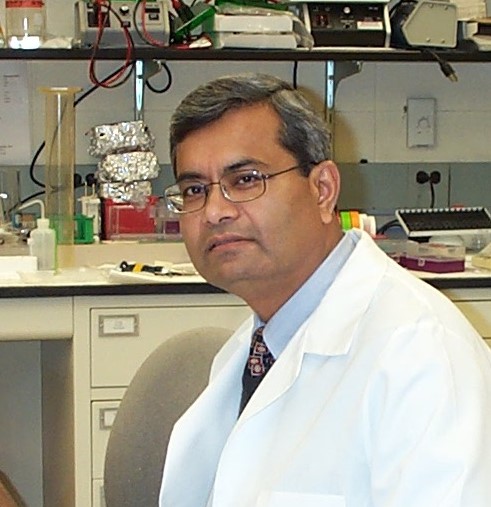Bhanu Jena, Ph.D., the George E. Palade University Professor and Distinguished Professor of Physiology at the Wayne State University School of Medicine, will receive the 2024 Lipid Science Prize from the Camurus Lipid Research Foundation, the same prize won by the 2023 winner of the Nobel Prize in Physiology or Medicine.
The Lipid Science Prize, established in 2017, is presented to an internationally leading scientist who has provided outstanding contributions to the scientific progress and understanding of complex lipid systems, their structures, biological roles or life science applications.

The foundation awarded the 2021-2022 prize to Professor Katalin Kariko, Ph.D., adjunct professor of Neurosurgery at the University of Pennsylvania’s Perelman School of Medicine, and Professor Pieter Cullis. Dr. Kariko later shared the 2023 Nobel Prize in Physiology or Medicine with Drew Weissman, M.D., Ph.D., the Roberts Family Professor in Vaccine Research at the University of Pennsylvania for their work in nucleoside base modifications that enabled the development of effective mRNA vaccines against COVID-19.
“I am honored to be selected to receive the 2024 Camurus Lipid Science Prize for discovery of the porosome,” Dr. Jena said. “It is humbling and immensely gratifying to see how basic research leading to the discovery of the porosome and its molecular underpinnings is now being translated to help treat a wide range of debilitating diseases. Secretory disorders, like cystic fibrosis, diabetes and Alzheimer’s can now be better understood and treated.”
Dr. Jena, a pioneer in modern cell biology, will be recognized in May for his discovery of the porosome, the universal secretory machinery in cells.
In the mid-1990s, Dr. Jena discovered the then-new cellular structure, which governs secretion in cells. During the next 30 years, he and his research team solved the structure and composition of the porosome complex, and functionally reconstituted it into lipid membrane and in live cells.
Porosomes are cup-shaped lipoprotein structures at the cell plasma membrane, where secretory vesicles transiently dock and fuse to release intra-vesicular contents during secretion. Porosomes measure around 100 to 180 nanometers in endocrine and exocrine cells and 15 nanometers at the nerve terminal. Porosomes are composed of approximately 30 proteins. The principles discovered and described by Dr. Jena proved to be universal, operating similarly in all animal cells.
A number of human diseases are caused by mutations in some of the 30+ proteins composing the porosome complex. Dr. Jena’s discovery of the porosome, in addition to providing a deep understanding of cell secretion, has contributed to the establishment of a drug development platform for the treatment of a wide range of diseases. Among the examples of the therapeutic application of the porosome discovery is the reconstitution of the porosome complex into the cystic fibrosis transmembrane conductance regulator mutated cells that restore normal mucin secretion, and porosome reconstitution into stem cell-derived insulin-secreting beta cells in the treatment of Type 1 diabetes. A recent editorial published in Discoveries Journals summarizes Dr. Jena’s contributions, including his discovery of the porosome.
In recent years, Dr. Jena's laboratory has developed Differential Expansion Microscopy, and new and novel approaches to understand the energetics of single biological molecules as they interact with other molecules, including ions, capable of revealing the structure-function of proteins at the single molecular level and its use in detection of pathogens, disease and therapy.
Dr. Jena, who directs the WSU Institute of NanoBioScience, has received numerous awards, including fellowship of the American Association for the Advancement of Science; foreign member of the Georgian National Academy of Science; foreign member of the Korean Academy of Science & Technology; foreign member of the Romanian National Academy of Medicine; the Swebelius Cancer Research Award; the Hallim Distinguished Award Lecture, shared with Nobel Laureate Ahmed Zewail; the Sir Aaron Klug Award; the American Society of Animal Science Basic Biological Science Award; the Ranbaxy Basic Research in Medical Sciences Award; the George E. Palade Gold Medal; the European Union Academy of Science; the Academy of Scholars at Wayne State University; six honorary doctorates, including one from Babes-Bolyai University, Romania, shared with Nobel Laureates George Palade and Günter Blobel; the Distinguished Scientist Award from the Society for Experimental Biology and Medicine; and distinguished visiting professorships from a number of institutions globally.
The Lipid Science Prize, which carries a 500,000 Swedish krona (about $47,000) stipend, will be presented to Dr. Jena on May 2 in Lund, Sweden. The award ceremony is a day-long event with lectures by the laureate followed by festivities.